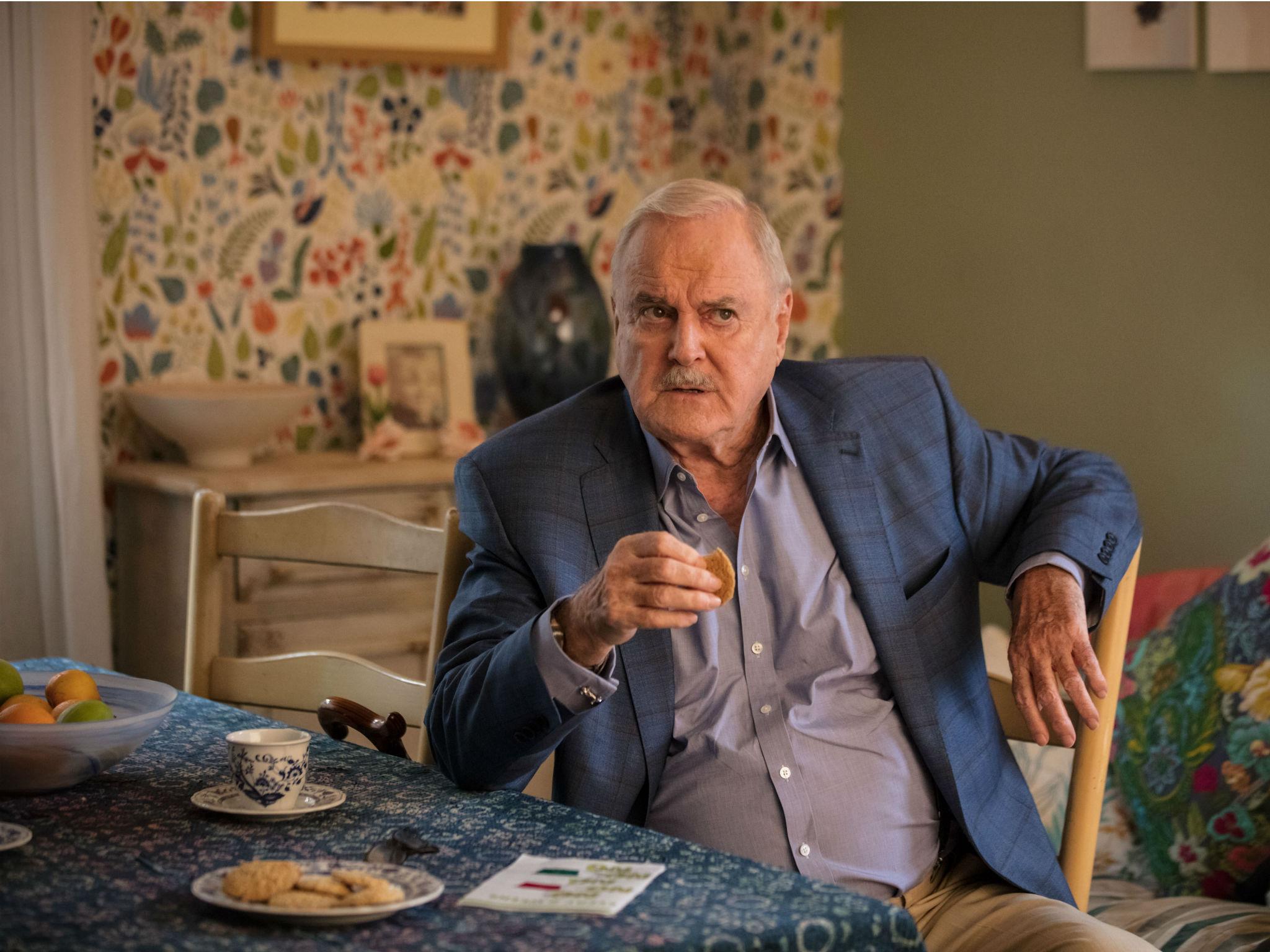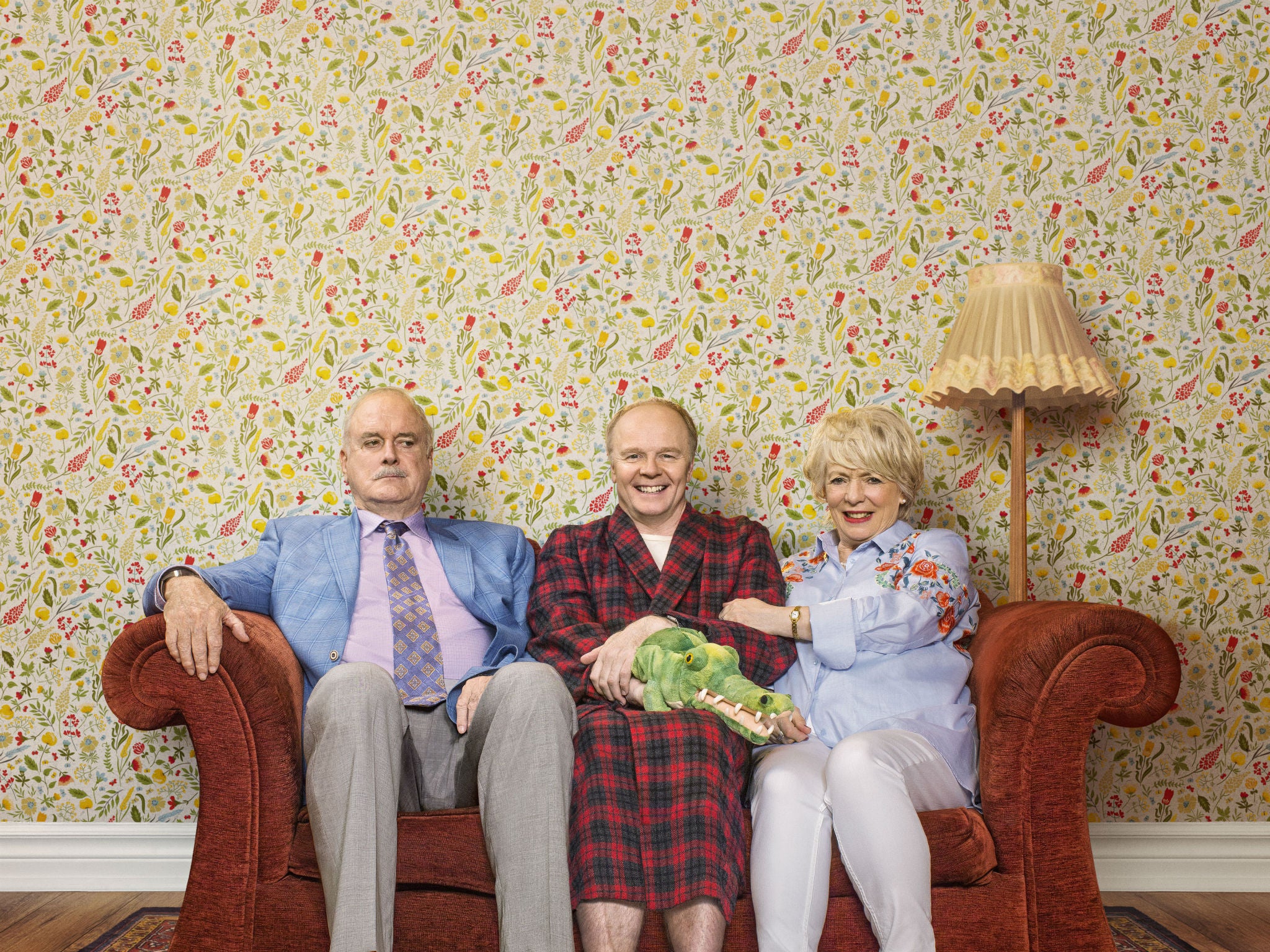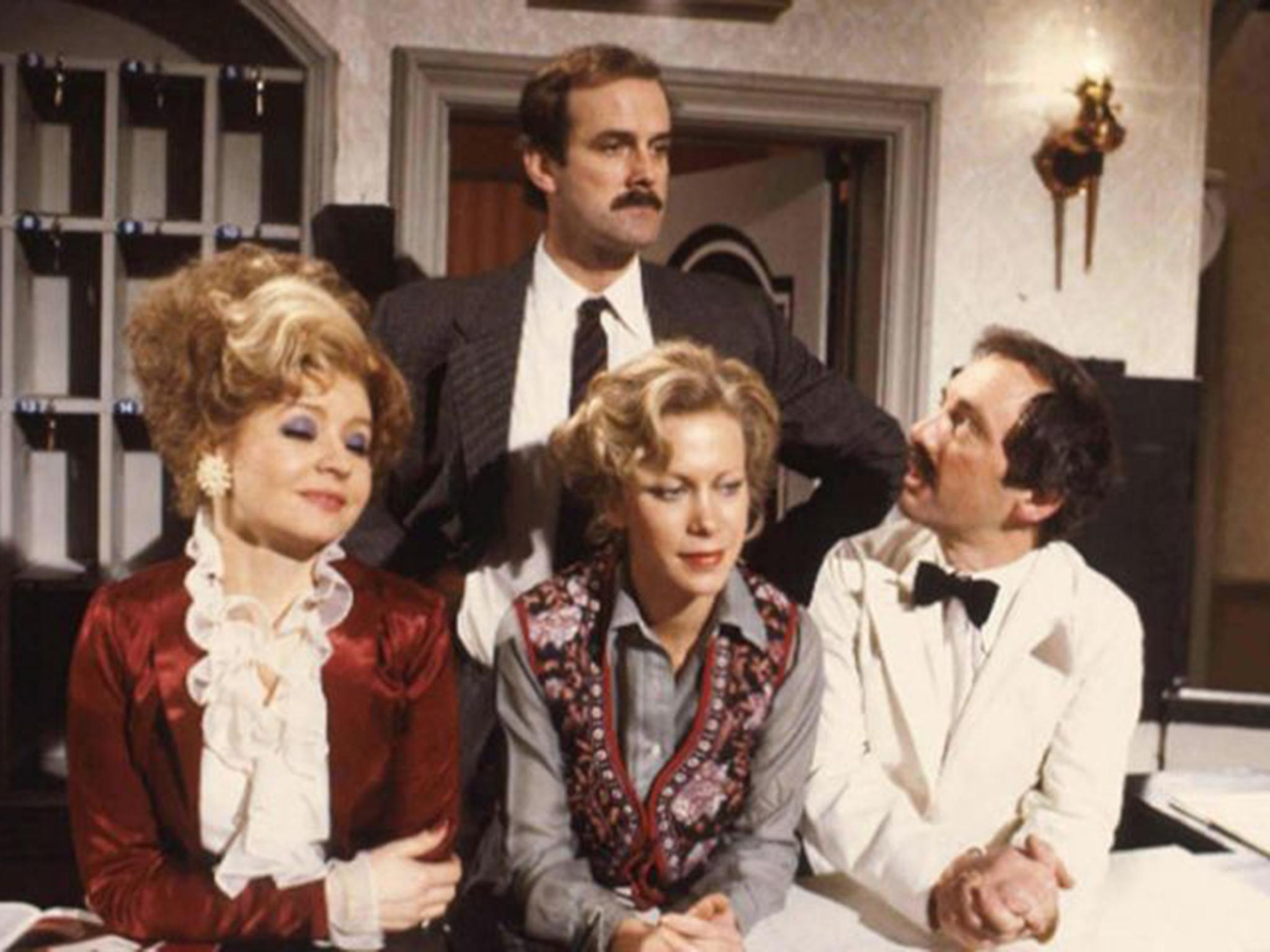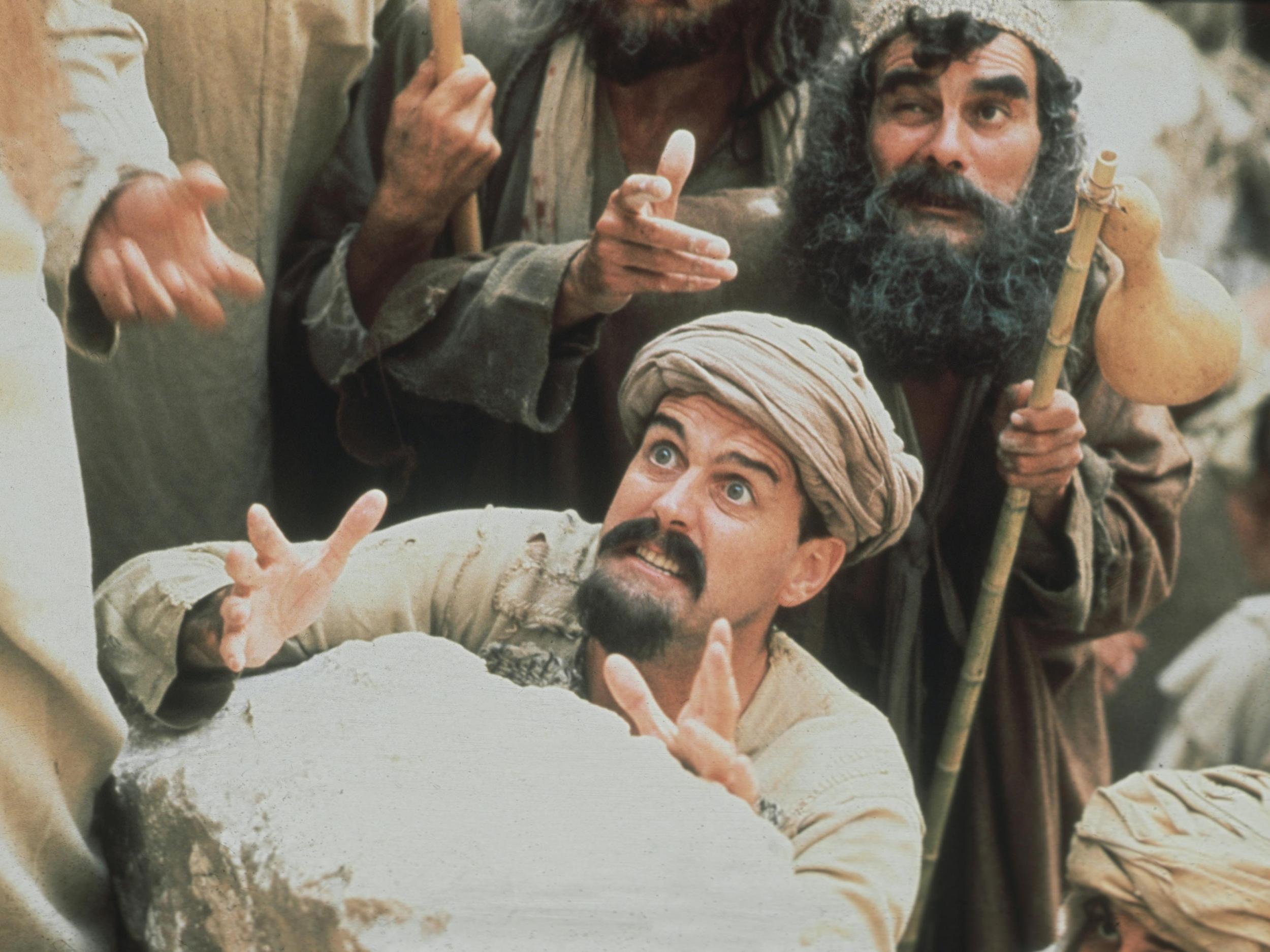The return of John Cleese: 'If I ever tried to do a Fawlty Towers-type sitcom again, everyone would say, ‘It’s not as good as Fawlty Towers’
The 'Fawlty Towers' actor, who is fondly remembered for his role as hotel owner Basil Fawlty, is starring with Alison Steadman in a new BBC sitcom, Hold the Sunset', after a gap of 43 years

Your support helps us to tell the story
From reproductive rights to climate change to Big Tech, The Independent is on the ground when the story is developing. Whether it's investigating the financials of Elon Musk's pro-Trump PAC or producing our latest documentary, 'The A Word', which shines a light on the American women fighting for reproductive rights, we know how important it is to parse out the facts from the messaging.
At such a critical moment in US history, we need reporters on the ground. Your donation allows us to keep sending journalists to speak to both sides of the story.
The Independent is trusted by Americans across the entire political spectrum. And unlike many other quality news outlets, we choose not to lock Americans out of our reporting and analysis with paywalls. We believe quality journalism should be available to everyone, paid for by those who can afford it.
Your support makes all the difference.When announcing the return of John Cleese to BBC sitcoms after a gap of 43 years, Shane Allen, the BBC’s controller of comedy commissioning, declared: “It’s a huge pleasure to welcome John Cleese back to the land of BBC sitcom – his last one did all right.”
It certainly did. Even though only 12 episodes were ever made, Fawlty Towers is regularly voted the best British sitcom ever. In a poll of industry professionals by the British Film Institute in 2000, it received the accolade of the greatest British television programme of all time. The series still does terrific business on Netflix, Amazon and iTunes.
To underline its enduring popularity, even today in pubs you hear people quoting great swathes of the Fawlty Towers script verbatim. The sitcom has also spawned an extraordinary spin-off industry. Fawlty Towers Live, adapted for the stage by Cleese, has played to sell-out audiences in Australia.
Meanwhile, you can attend “The Faulty Towers Dining Experience” in countries as diverse as the UK, Papua New Guinea, Malta, Singapore, Australia, Antigua and Ireland. The sitcom, about the endless trials and tribulations of the perennially frustrated, social-climbing hotel owner Basil Fawlty (Cleese), has the global reach of Game of Thrones – but it’s considerably funnier.

Now, after an absence of nearly half a century, Cleese is returning to BBC sitcom with Hold the Sunset. Scripted by the Oscar-nominated writer Charles McKeown (Brazil), the six-part series centres on a pair of ageing neighbours and former sweethearts, Phil (Cleese) and Edith (Alison Steadman).
They rekindle their romance, but their plans to get married are cruelly scuppered when her 50-year-old son, Roger (Jason Watkins from Line of Duty), turns up out of the blue on her doorstep. He announces that he has left his wife, children and job in a bank and is moving back in with his mum. “Aghast” does not begin to describe Phil’s reaction to this development.
Over lunch, The Independent sits down with Cleese in his dressing room at Twickenham Studios. They say that you should never meet your heroes, but I’m very glad to report that the comedian more than lives up to my expectations.
In person, he is much warmer than many of his screen alter egos. He is thoughtful and takes the time, for instance, to make me a delicious espresso at the start of the interview. And, I’m relieved to say, he shares none of Basil Fawlty’s intolerance or incandescent, irrational anger. Cleese is intelligent, interesting, interested and – which is certainly not true of all comics – genuinely funny.
The comedian, who can also lay claim to have been one of the troupe responsible for both the greatest British comedy film of all time (Monty Python’s Life of Brian) and the greatest British sketch show of all time (Monty Python’s Flying Circus), begins by reflecting on the lasting success of Fawlty Towers.

Cleese, who met his future Monty Python writing partner Graham Chapman at the Cambridge Footlights in the early 1961, is very pleased that Fawlty Towers continues to enjoy a huge worldwide audience.
When I tell him that my father still to this day falls off the sofa laughing when he watches an episode of Fawlty Towers, the 78-year-old Cleese is clearly gratified: “That’s the highest praise!” He continues that, “People use the show as a mood-changer, which is lovely. It makes people feel better, and I’m delighted about that.”
Despite repeated pleas, however, Cleese and his co-writer and ex-wife Connie Booth have always resisted the temptation to revive Fawlty Towers. They think, quite rightly, that it is best to go out at the top. It is already hailed as a funniest sitcom of all time, so how can you better that? All you would be doing would be setting yourself up for disappointment and criticism.
Cleese, who is married to the jewellery designer Jennifer Wade, reflects that, “You wanted Fawlty Towers to be as good as possible, and it’s done and you’re proud of it, and then you suddenly realise that the bar has now got too high.
“If I ever tried to do a Fawlty Towers-type sitcom again, everyone would say, ‘Well, it’s got its moments, but it’s not as good as Fawlty Towers’, so there’s not much point in doing that. You have to do different things.”

So was Cleese concerned that people would inevitably make comparisons between Hold the Sunset and Fawlty Towers? Apparently not.
The comedian emphasises that he does not feel under any pressure in the new sitcom, “Because I’m not writing this. I come to Hold the Sunset just as an actor. It hasn’t been my creation. Instead of looking at me and three others on Fawlty Towers, the audience have five or six other key players to watch in Hold the Sunset.”
Cleese, who played Steadman’s husband in the movie Clockwise 32 years ago and says being reunited with her on this show is “heaven”, goes on to underline that he has relished his role in Hold the Sunset. “I’ve only just realised that Phil is almost exactly like me! When you stop reading it and start playing it, you can immediately see that.
“Phil sits around making sarcastic remarks – that’s exactly how I am in real life! I keep thinking, ‘I know how to say that line because that’s exactly how I’d say it in real life.’ But he’s also capable of great tenderness. He’s really in love with his old flame, Edith. It’s been an absolute pleasure to play him.”
Cleese certainly delivers a winning performance as Phil. Yes, he has shades of Fawlty-esque tetchiness, but he is also capable of manifesting the kind of warmth and affection that we never saw in the perma-furious Torquay hotelier. In one scene, he looks across the kitchen table at Edith and sighs adoringly: “’Let me put the kettle on’ – you make it sound so alluring.”

During a career spanning more than five decades, Cleese has received a dizzying array of awards. As an example, he is surely the only human being in history who has had a species of lemur, an asteroid and a municipal rubbish heap in New Zealand named after him.
His major breakthrough came with the first series of Monty Python in 1969. Enormously well-loved on both side of the Atlantic, that anarchic, irreverent sketch show can truly be said to have changed the face of comedy.
With Terry Gilliam, Eric Idle, Terry Jones and Michael Palin, Cleese was part of a highly successful and really quite emotional series of Python reunion shows at the O2 Arena in London four years ago.
He recalls as a highlight the moment he and Palin corpsed during their performance of Monty Python’s most famous routine, the timeless “Dead Parrot” sketch. He and his colleague were incapable with laughter, so the audience just stepped in, reciting the lines for them.
“It’s no longer anything to do with what I used to do on Python,” Cleese recollects. “It’s a completely different animal now because the audience know the script as well as we do.
“So, you might wonder, what on earth were they doing there? Well, they were there to have a good time. In a funny way, they also came to say goodbye – not in a sad way; they were simply saying, ‘Thank you for making us laugh for the last 45 years.’ And in turn, we were saying, “Thank you for thanking us.’ It was a totally happy atmosphere.”
By his own admission, in the past Cleese did not rate what he did for a living very much. “I was too ‘Cambridge’ and made too much of a distinction between high and low art. But at that moment on stage at the O2 during the ‘Dead Parrot’ sketch, I suddenly thought, ‘You know, this is actually very useful to people’s happiness’.”
The comedian carries on that, “Shortly after that I went on Graham Norton’s talk show with Neil Diamond. When he sang ‘Sweet Caroline’, the audience sang along to every word. You could see them all looking so happy together. There was no backbiting or snitching.
“Everyone was enjoying each other’s company. I realised that was a very important experience. I suddenly valued that rather more than I had been doing over the years. It was really quite educational.”
Cleese is absolutely right to value what he does. In a career stretching back to his West End and Broadway debut in the 1963 Footlights revue, Cambridge Circus, he has brought deep joy to untold millions of people.
Many of them are still eager to express their gratitude to Cleese. He muses that, “What I find very touching is when people come up to me in the street and say, ‘Thank you for making me laugh for the last 50 years’. That occurs two or three times a day.
“It never happens without my feeling, ‘That’s lovely.’ I never used to feel this, but I’ve actually done something good. Making people laugh is basically a very good thing indeed.”
‘Hold the Sunset’ starts on BBC1 at 7.30pm on 18 February
Join our commenting forum
Join thought-provoking conversations, follow other Independent readers and see their replies
Comments